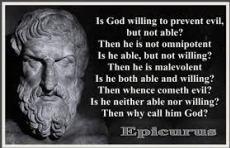

The Problem of Evil
Augustine’s viewpoint on the study of evil is largely based on teachings from the bible as he believed very strongly in its stories and teachings. Augustine took many teachings literally and proposed his theodicy to prove God’s existence as omnibenevolent, omniscient, omnipotent and to solve the problem of suffering and evil in this ‘perfect world’ that God has created. When discussing the topic of the problem of evil, there are two major assumptions, the first being that evil did not come from God since his creation is faultless and the second that evil having come from elsewhere God is justified in allowing it to stay.
To begin his theodicy, he started with the explanation that God is perfect. He described the created order as good and that God is the source of creation and ‘God saw that it was good.’ Augustine believed that evil does not exist and that what we describe to be evil is just a privation of goodness. For example, there is no such thing as darkness, there is just a privation of light. So God cannot have made it.
However, Augustine understands that God has given free will to humans, therefore allowing for there to be a lack of goodness when there is human action. He accepts the story of Adam and Eve as an explanation for the defective side of human nature. When given free will, Augustine stated that humans deliberately chose to turn away from what Gods intentions were and that is how evil is formed. For example, Adam turned from God and caused Eve to fall also in the story of the Fall, this is what allowed for bad things to happen. As all of humanity was ‘seminally present’ in Adam, this explains why everyone is born sinful. The Fall also affected the world itself and ‘set all nature aury.’ Therefore Augustine explains that ‘all evil is sin or punishment for sin.’
Although, Augustine furthers his theodicy by stating that only God can be perfect. This means that as humans are not perfect, there must be some fault, that being that all humans are born with a privation of evil. The misuse of God’s freedom has led to catastrophic consequences. Augustine blames humans for all natural and moral evil in this world as human action disrupts the natural and moral evil in this world as human action disrupts the natural order of things in this world.
Furthermore, Augustine believed that Jesus was sent to save humanity from sin by God, thus demonstrating God has the right to be transcendent from his creation, as suffering is all down to human error and not God. By God sending Jesus to save those who turn to hum, God shows his grace and at the end of history, there will be judgement, God will then decide whether a being may be sent to heaven or hell.
Image- http://www.logicandlight.org/the-problem-of-evil/

0 Comment:
Be the first one to comment on this article.